Double Cropping with Cereal Grain Forages
![]()
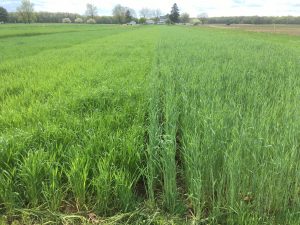 Corn silage producers have opportunities in Southern Michigan to double crop by planting cereal grains after corn silage, and harvesting the cereal grains the following spring for forage, prior to planting the next year’s crop.
Corn silage producers have opportunities in Southern Michigan to double crop by planting cereal grains after corn silage, and harvesting the cereal grains the following spring for forage, prior to planting the next year’s crop.
In 2017/18 at the Kellogg Farm, we tested five different cereal grain crops provided by Byron Seeds to evaluate forage quantity and quality, and assess the feasibility of fitting this crop in between two full season crops. Cereal rye produced the most forage biomass, but winter wheat produced the highest quality forage. Perhaps more importantly, we were able to grow a 60+ bushel soybean crop following the harvest of the cereal grains, effectively double cropping while also integrating manure as the fertility source for both crops. Read more about the details of the study through the link below.
Cover Crop Forages after Corn Silage
Explore other current research projects at the Kellogg Farm with the tabs below.
Soybean SMART On-Farm Research
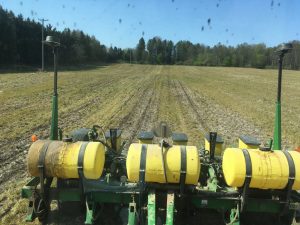 The Kellogg Farm participated in the MSU Extension Soybean Management and Research Technology (SMART) On-Farm research trials in 2018, participating in both planting rate and complete seed treatment studies. The full SMART report can be found online; the trials at the Kellogg Farm can be identified by looking for the Barry county sites in the planting rate and complete seed treatment sections.
The Kellogg Farm participated in the MSU Extension Soybean Management and Research Technology (SMART) On-Farm research trials in 2018, participating in both planting rate and complete seed treatment studies. The full SMART report can be found online; the trials at the Kellogg Farm can be identified by looking for the Barry county sites in the planting rate and complete seed treatment sections.
Data from the Kellogg Farm were consistent with other farms across Michigan showing that maximum economic returns are produced by seeding rates of 100,000 soybean seeds per acre, which is lower than most production fields. Complete seed treatment (fungicide mix + insecticide) resulted in a 2.3 bushel yield advantage at the Kellogg Farm; while the average advantage for all participating farms combined was only 1.2 bushels, which was not enough to pay for the cost of the seed treatment.
Organic Oat Variety Trial
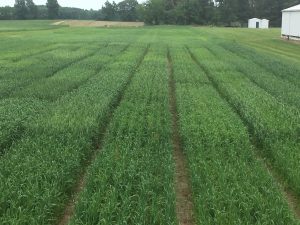 Oats are a crop that are included in our food system through a variety of channels, including oatmeal, bread products, beer and through livestock feed. Trials evaluating organic oat varieties were initiated in 2018 at the Kellogg Farm and the Upper Peninsula Research and Extension Center (UPREC). Objectives included assessing oat varieties for yield and quality parameters related to malting, de-hulling, and human consumption.
Oats are a crop that are included in our food system through a variety of channels, including oatmeal, bread products, beer and through livestock feed. Trials evaluating organic oat varieties were initiated in 2018 at the Kellogg Farm and the Upper Peninsula Research and Extension Center (UPREC). Objectives included assessing oat varieties for yield and quality parameters related to malting, de-hulling, and human consumption.
Preliminary data from the trial indicate a substantial differences between varieties in yield, lodging and heading date. As more data are generated from other sites and through quality analysis, the document below will be updated.
Organic Winter Squash
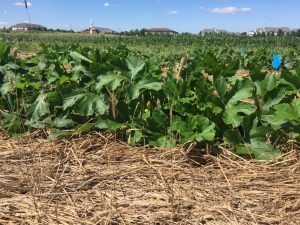 Winter squash is one of the most important organic vegetable crops in Michigan. MSU Horticulture, Pathology, and Entomology are working on a three year project to find solutions to some of the states most pressing production problems associated with organc winter squash systems. MSU Horticulture masters student, Marisa Benzle, managed the first year of field trials in 2017 where solutions to cultivar choice, efficacy of reduced tillage, pest control, weed control, and nutrient management were tackled under the supervision of Dr. Brainard, Dr. Szendrei, Dr. Hayden, and Dr. Hausbeck.
Winter squash is one of the most important organic vegetable crops in Michigan. MSU Horticulture, Pathology, and Entomology are working on a three year project to find solutions to some of the states most pressing production problems associated with organc winter squash systems. MSU Horticulture masters student, Marisa Benzle, managed the first year of field trials in 2017 where solutions to cultivar choice, efficacy of reduced tillage, pest control, weed control, and nutrient management were tackled under the supervision of Dr. Brainard, Dr. Szendrei, Dr. Hayden, and Dr. Hausbeck.
Nitrous Oxide Emissions
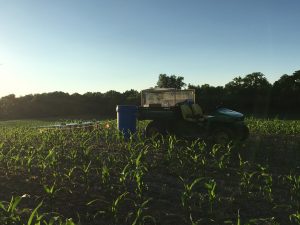 Nitrous oxide (a strong greenhouse gas) emissions are closely linked to soil moisture. As such, changing rainfall patterns associated with climate change may alter nitrous oxide fluxes in agricultural soils. This effect of changing rainfall patterns may also differ across a field. By using rainfall manipulation shelters at summits and depression, we are able to simulate current and future extreme precipitation regimes. Understanding these patterns and the mechanisms that underlie them is crucial for predicting responses to climate change and for designing mitigation strategies to forestall potential increases in N2O production. KBS Graduate Student Kate Glanville is leading this research effort as part of her dissertation.
Nitrous oxide (a strong greenhouse gas) emissions are closely linked to soil moisture. As such, changing rainfall patterns associated with climate change may alter nitrous oxide fluxes in agricultural soils. This effect of changing rainfall patterns may also differ across a field. By using rainfall manipulation shelters at summits and depression, we are able to simulate current and future extreme precipitation regimes. Understanding these patterns and the mechanisms that underlie them is crucial for predicting responses to climate change and for designing mitigation strategies to forestall potential increases in N2O production. KBS Graduate Student Kate Glanville is leading this research effort as part of her dissertation.
Bovine Leukemia Virus
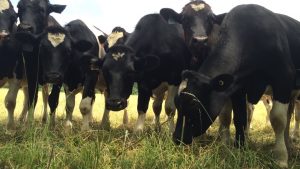 Faculty and students from MSU’s College of Veterinary Medicine are researching multiple aspects of Bovine Leukemia Virus (BLV), including effects on dairy herds and methods to eliminate the virus. BLV causes enzootic bovine leucosis, which is characterized by an abnormally large number of lymphocytes and can lead to malignant lymphoma. The research efforts occurring at the Kellogg Farm are led by Dr. Paul Bartlett and Vickie Ruggiero More information can be found on the BLV website. Check out a recent article written for Hoard’s Dairyman about this research.
Faculty and students from MSU’s College of Veterinary Medicine are researching multiple aspects of Bovine Leukemia Virus (BLV), including effects on dairy herds and methods to eliminate the virus. BLV causes enzootic bovine leucosis, which is characterized by an abnormally large number of lymphocytes and can lead to malignant lymphoma. The research efforts occurring at the Kellogg Farm are led by Dr. Paul Bartlett and Vickie Ruggiero More information can be found on the BLV website. Check out a recent article written for Hoard’s Dairyman about this research.
Winter Malting Barley
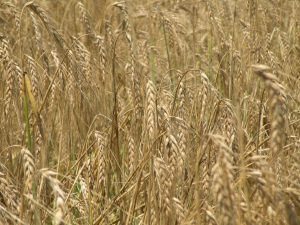 Trials of winter malting barley were started at Michigan State University in 2016 at KBS and the Saginaw Valley Region, and continue under the direction of Dr. Dean Baas and Dr. Brook Wilke. The goal of the research is to optimize yields while also meeting quality parameters for the malting industry. The reports below summarize the data, observations and recommendations made from these trials through June, 2018.
Trials of winter malting barley were started at Michigan State University in 2016 at KBS and the Saginaw Valley Region, and continue under the direction of Dr. Dean Baas and Dr. Brook Wilke. The goal of the research is to optimize yields while also meeting quality parameters for the malting industry. The reports below summarize the data, observations and recommendations made from these trials through June, 2018.
Winter Barley Management Guidelines 2018
Winter Malting Barley Variety Trial 2018
Kernza® - Perennial Intermediate Wheatgrass for Grain and Forage
Intermediate Wheatgrass Grain aka Kernza® is a perennial plant that is being developed by the Land Institute in Salina, Kansas as a potential substitute to annual grains like wheat, oats, barley, etc., that humans currently consume. Michigan State University has had the opportunity to grow, process and market Kernza® through work with Kellogg Farm. In 2017, 1300 lbs of grain were harvested and 300-400 lbs of Kernza® was cleaned and dehulled in partnership with Macon Creek Malt House. In the end, there is more research that needs to be done on Kernza® before there can be proper recommendations for farmers and companies regarding this grain product. To read the full article about Kernza® , check out the link here!
Initial Experience with Growing, Processing and Marketing in Michigan, 2017

10461 N. 40th St.
Hickory Corners, MI 49060
(269) 671-2402
kelloggfarm@kbs.msu.edu